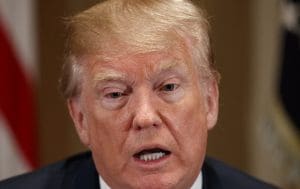Nobel Prize-winning doctors slam Trump’s prescription drug scam
The international humanitarian group Doctors Without Borders issued a stinging rebuke of Trump’s plan to address prescription drug costs by pandering to the pharmaceutical industry.

The international medical humanitarian group Doctors Without Borders/Médecins Sans Frontières (MSF) slammed Trump’s speech on prescription drug prices Friday, using the White House’s own words to savage the sham proposal.
In a statement, MSF said Trump’s proposed plan to address prescription drug costs “fails to address the root problem” of rising prices and could make medicine unaffordable for the world’s most vulnerable populations while still not reducing costs in the U.S.
The group also hit back at Trump’s suggestion that drug prices in the U.S. are high because other countries aren’t paying their fair share — a suggestion that mirrors Trump’s misguided statements about NATO members.
“Other countries aren’t ‘free-riding,’ and lifesaving medicines aren’t more expensive here because they cost less elsewhere,” MSF said.
MSF’s fiery response is a direct rebuttal to the language used by the White House to describe the problem of rising drug costs.
In February, the White House Council of Economic Advisers issued a report saying that “free-riding” from other countries is “the root of the problem.” In its attempt to blame other countries for the cost of prescription drugs in the U.S., the White House report used the phrases “free-ride” and “free-riding” 15 times.
While Trump has previously identified pharmaceutical companies as the primary culprit behind rising drug prices, he has changed his tune in recent days and become much more sympathetic to the $446 billion industry.
The change comes after a series of meetings between Trump and the very same pharmaceutical industry leaders he once denounced. It also follows the recent news that Trump’s personal lawyer, Michael Cohen, sold access to the White House to pharmaceutical giant Novartis for a price tag of $1.2 million.
Instead of holding drug-makers accountable for the cost of prescription medication, Trump now thinks the solution to high drug prices in the U.S. is to raise prices everywhere else.
Defending the pharmaceutical industry’s practice of marking up the price of prescription drugs, Trump claims that prices in the U.S. are high because the money is needed to fund medical research and innovation — an assertion that lets drug companies off the hook entirely.
But when researchers examined his claim in a recent study, they found that pharmaceutical companies earn “substantially more” than what they invest in research and innovation.
The study concluded that drug companies could easily lower U.S. prices without raising the cost of drugs overseas, while still maintaining the same level of investment in research and innovation.
MSF slammed Trump for giving the pharmaceutical industry a pass, saying he is missing “the root problem,” which it identifies as “a broken research and development system that allows companies to benefit from taxpayer-funded research while charging whatever prices they want.”
Trump promised on Friday that “we are going to see those prices go down” — but his speech was so favorable to the industry that it sent drug stocks soaring immediately afterwards.
In denouncing Trump’s prescription drug scam, MSF — which was awarded the Nobel Peace Prize in 1999 — is fulfilling its mission of giving a voice to the voiceless and speaking truth to power. Meanwhile, Trump is doing what Trump does best: standing up for powerful big money interests and making taxpayers foot the bill.
Recommended

Biden campaign launches new ad focused on Affordable Care Act
Former President Trump has said he wants to do away with the popular health care law.
By Kim Lyons, Pennsylvania Capital-Star - May 08, 2024
Ohio doctors fear effects of emergency abortion care case set to go before U.S. Supreme Court
A federal law that allows emergency departments to treat patients without regard to their ability to pay will be under U.S. Supreme Court scrutiny this week, and Ohio doctors are concerned about the case’s local impact on emergency abortion care.
By Susan Tebben, Ohio Capital Journal - April 23, 2024
House GOP votes to end flu, whooping cough vaccine rules for foster and adoptive families
A bill to eliminate flu and whooping cough vaccine requirements for adoptive and foster families caring for babies and medically fragile kids is heading to the governor’s desk.
By Anita Wadhwani, Tennessee Lookout - March 26, 2024












































































